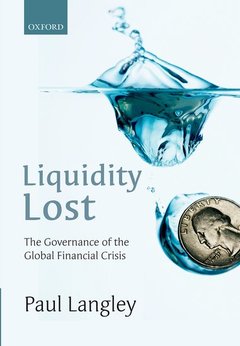Description
Liquidity Lost
The Governance of the Global Financial Crisis
Author: Langley Paul
Language: English
Subjects for Liquidity Lost:
Approximative price 117.78 €
In Print (Delivery period: 21 days).
Add to cart
Liquidity Lost
Publication date: 12-2014
236 p. · 16.3x23.8 cm · Hardback
Publication date: 12-2014
236 p. · 16.3x23.8 cm · Hardback
Approximative price 43.23 €
In Print (Delivery period: 21 days).
Add to cart
Liquidity Lost
Publication date: 04-2016
236 p. · 15.7x23.4 cm · Paperback
Publication date: 04-2016
236 p. · 15.7x23.4 cm · Paperback
Description
/li>Biography
/li>
Contributing to interdisciplinary debates in cultural economy and the social studies of finance, and grounded in extensive empirical research, Liquidity Lost offers an innovative analysis of how the contemporary global financial crisis was governed. Through an exploration of the interventions made by central banks, treasuries, and regulatory authorities in the Anglo-American heartland of the crisis between 2007 and 2011, experimental and strategic apparatuses of crisis governance are shown to have emerged. These discrete apparatuses established six technical problems to be acted upon - liquidity, toxicity, solvency, risk, regulation, and debt - but also shared certain proclivities and preferences. Crisis governance assembled discourses and devices of economy in relation with sovereign monetary, fiscal, and regulatory techniques, and elicited an affective atmosphere of confidence. It also sought to secure the financialized way of life which turns on the opportunities ostensibly afforded by uncertain financial circulations, and gave rise to post-crisis technical fixes designed to advance the resilience of banking and the macro-prudential regulation of financial stability. Thus, the consensus that prevails across economics, political economy, and beyond - wherein sovereign state institutions are cast as coming to the rescue of the markets, banking, or neo-liberal capitalism - conceals a great deal more than it reveals about the governance of the global financial crisis.
Paul Langley is Reader in Economic Geography at the Department of Geography, Durham University, UK. He has published extensively on many aspects of global finance, and is the author of two previous books: The Everyday Life of Global Finance (Oxford University Press, 2008); and World Financial Orders (Routledge, 2002).
© 2024 LAVOISIER S.A.S.




